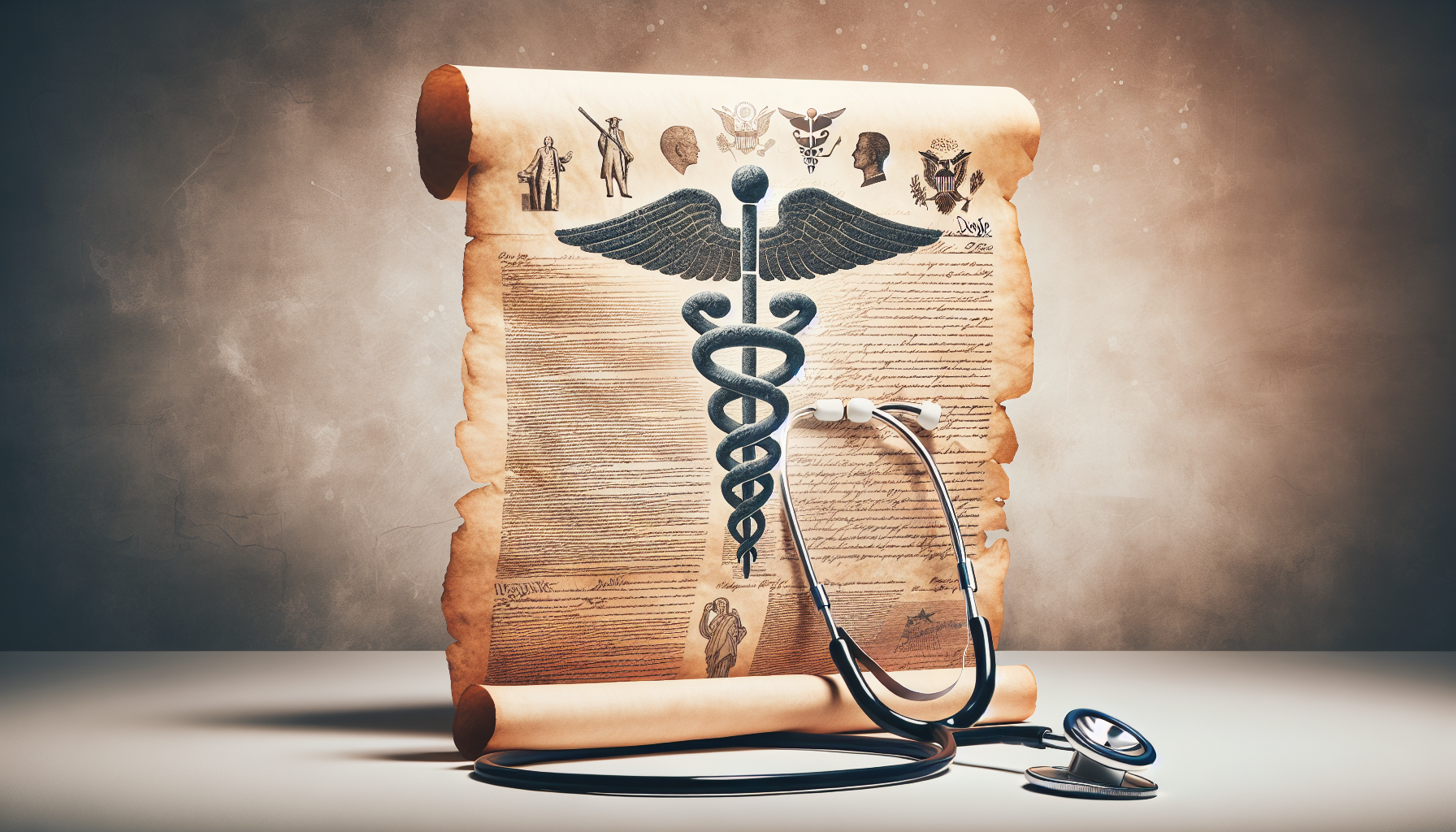Did you know that the issue of health is intricately linked to the United States Constitution? While it may not be explicitly mentioned, the Constitution serves as a guiding framework for various policies and laws that shape the nation’s healthcare system. Understanding the role of health in the US Constitution in safeguarding health rights and promoting well-being is crucial in grasping the comprehensive nature of overall healthcare in the United States. In this article, we will explore the various ways in which health intersects with the US Constitution and how it contributes to the overall fabric of American society.
Health in the US Constitution
The US Constitution, the supreme law of the land, is a foundational document that outlines the powers and limitations of the federal government. While the Constitution does not explicitly mention health, several articles and amendments have implications for public health and healthcare in the United States. In this comprehensive article, we will explore various sections of the Constitution and their relevance to health-related matters.
Article I: Legislative Powers
Section 8: Powers of Congress
Article I grants the Legislative Branch the authority to make laws for the country. Section 8 of this article enumerates the powers of Congress, including the power to lay and collect taxes, borrow money, regulate commerce, and provide for the general welfare of the nation. These broad powers give Congress the ability to legislate on matters relevant to health, such as healthcare regulation, funding for medical research, and the creation of public health initiatives.
Section 9: Limits on Congress
While Section 8 grants Congress considerable powers, Section 9 places certain limitations, restricting Congress from taking certain actions. However, these limitations do not directly impact health matters. Instead, they primarily address issues related to individual rights and freedoms.
Commerce Clause and Regulation of Health
One significant power granted to Congress by the Constitution is the authority to regulate commerce among the states. This power, known as the Commerce Clause, has been interpreted to extend to various aspects of public health, including the regulation of food and drug safety, healthcare insurance, and the implementation of health-related policies that impact interstate commerce.

Article II: Executive Powers
Section 2: Commander in Chief
Article II establishes the powers and responsibilities of the Executive Branch, headed by the President of the United States. Section 2 designates the President as the Commander in Chief of the military forces. While this section does not directly pertain to health, it grants the President the ability to deploy military resources in times of national emergencies, including public health crises.
Section 3: Presidential Duties
Section 3 outlines the duties of the President, which include the obligation to take care that the laws are faithfully executed. This duty can be interpreted to encompass the enforcement of health-related legislation and the oversight of agencies responsible for public health, such as the Centers for Disease Control and Prevention (CDC) and the Food and Drug Administration (FDA).
Section 4: Impeachment
Section 4 establishes the process for removing the President from office through impeachment. While impeachment proceedings do not directly impact health matters, they serve as a mechanism to hold the Executive Branch accountable for their actions, ensuring that public health decisions are made responsibly and ethically.
Article III: Judicial Powers
The Role of the Supreme Court
Article III establishes the Judicial Branch, which includes the Supreme Court of the United States. The Supreme Court serves as the final arbiter of legal disputes and plays a crucial role in interpreting the Constitution. The Court’s decisions on constitutional matters can have significant implications for health-related policies and rights.
Interpretation of the Constitution
The Supreme Court’s interpretation of the Constitution has shaped the landscape of health law in the United States. The Court’s landmark decisions, such as Roe v. Wade and National Federation of Independent Business v. Sebelius, have addressed reproductive rights and the constitutionality of the Affordable Care Act, respectively, impacting access to healthcare and shaping health policies nationwide.
Civil Rights and Health
The Constitution’s guarantee of civil rights, particularly in the Fourteenth Amendment’s Equal Protection Clause, plays a vital role in advancing health equity. The Supreme Court has held that the Equal Protection Clause prohibits discrimination on the basis of race, gender, and other protected characteristics, ensuring that individuals have equal access to healthcare services, regardless of their background.

Article IV: States’ Powers
Tenth Amendment and Health
The Tenth Amendment to the Constitution establishes that powers not delegated to the federal government are reserved to the states or the people. This amendment empowers states to enact laws and regulations related to health, allowing them to address the unique healthcare needs and preferences of their populations.
Public Health Powers of States
Under their police powers, states have the authority to protect and promote the health, safety, and welfare of their residents. This includes implementing public health interventions, such as vaccination requirements, disease surveillance systems, and health education campaigns, to safeguard the well-being of their communities.
Interstate Recognition of Health Rights
Article IV also includes the Full Faith and Credit Clause, which requires states to recognize the public acts, records, and judicial proceedings of other states. This provision facilitates the interstate recognition of health-related rights, enabling individuals to access healthcare services and benefits across state borders.
Full Faith and Credit Clause and Health
The Full Faith and Credit Clause may come into play when individuals seek healthcare services in states other than their own. This constitutional provision ensures that states honor valid medical licenses, certifications, and other health-related documents issued by other states, promoting access to healthcare for individuals who need to seek medical care across state lines.
Article V: Amendment Process
Adoption of Amendments
Article V outlines the process for amending the Constitution. This provision emphasizes the flexibility of the Constitution to adapt to societal changes and address emerging health concerns. It allows for amendments that can expand or limit the scope of federal power over healthcare and public health, shaping the legal framework within which health-related legislation is developed.
Amendment Process and Health-related Changes
The amendment process provides a mechanism for addressing health-related issues that may require constitutional reform. For example, the addition of the Nineteenth Amendment granted women the right to vote, enabling them to advocate for health policies and reforms that prioritize women’s health needs effectively.

First Amendment: Freedom of Expression
Implications for Health-related Speech
The First Amendment guarantees the freedom of speech, which has critical implications for health-related speech, including discussions and debates on public health issues. This constitutional protection enables individuals and organizations to express their opinions, advocate for health-related causes, and engage in public discourse that can shape health policies and initiatives.
Protection of Health-related Advocacy
The First Amendment safeguards the rights of individuals and organizations to advocate for health-related issues, allowing them to raise awareness, inform the public, and push for policy changes. This protection ensures that voices concerned with public health can be heard, contributing to the development and implementation of informed and effective health policies.
Fourth Amendment: Protection against Unreasonable Searches and Seizures
Implications for Medical Privacy
The Fourth Amendment safeguards individuals’ right to privacy and protects them against unreasonable searches and seizures by the government. This protection extends to medical privacy, ensuring that individuals can maintain confidentiality regarding their personal health information, including medical records and sensitive health-related data.
Search Warrants and Health Records
In cases involving health records and medical information, the Fourth Amendment requires law enforcement agencies to obtain search warrants, based on probable cause, before accessing such records. This safeguard ensures that individuals’ privacy is respected and prevents unwarranted intrusion into personal health information.

Tenth Amendment: Powers not Delegated to the United States
Residual Powers of the States
The Tenth Amendment reinforces the separation of powers between the federal government and the states. The residual powers not delegated to the federal government are retained by the states. This provision allows states to develop and implement health policies and regulations that address the specific needs and priorities of their residents.
State Policymaking and Health Measures
The Tenth Amendment empowers states to take the lead in developing and implementing health measures, allowing them to tailor policies to their unique circumstances. This flexibility enables states to respond to public health crises, enact health insurance reforms, and regulate healthcare providers within their jurisdictions, fostering a diverse and adaptable healthcare landscape in the United States.
Fourteenth Amendment: Equal Protection
Equal Protection Clause and Health-related Policies
The Fourteenth Amendment’s Equal Protection Clause ensures that individuals are entitled to equal protection under the law. This constitutional guarantee has significant implications for health-related policies, as it prohibits discrimination in access to healthcare services, treatment, and health insurance based on protected characteristics, such as race, gender, or disability.
Discrimination and Access to Healthcare
The Equal Protection Clause prohibits discrimination in healthcare, facilitating equal access to healthcare services and ensuring that individuals are not denied care or treated differently based on protected characteristics. This provision has been instrumental in addressing healthcare disparities and advancing health equity, promoting equal treatment and opportunities for individuals across diverse populations.
In conclusion, while the US Constitution does not explicitly address health, various articles, amendments, and clauses have profound implications for health-related matters. Understanding the interplay between the Constitution and public health is essential for navigating and shaping the legal framework within which healthcare and health policy decisions are made in the United States.

Hope this article about Health In The US Constitution was of interest, why not check out ‘Public Health Issues USA‘

